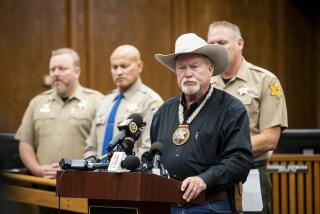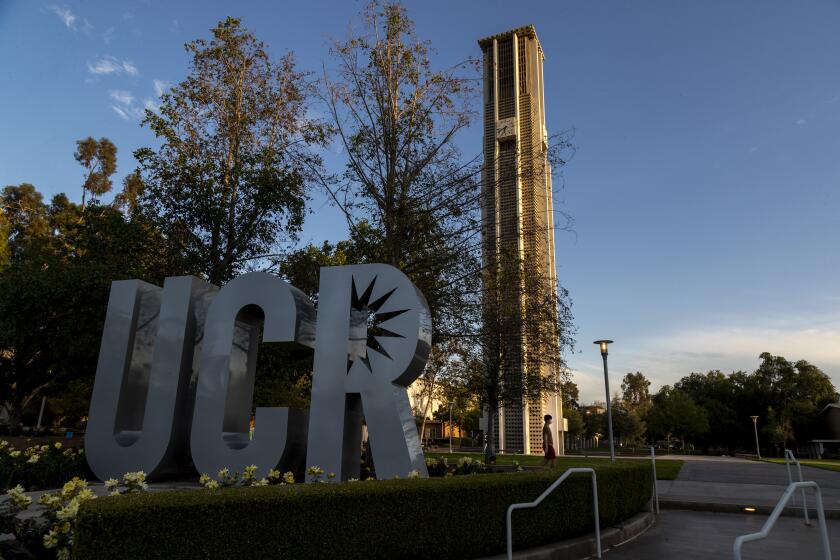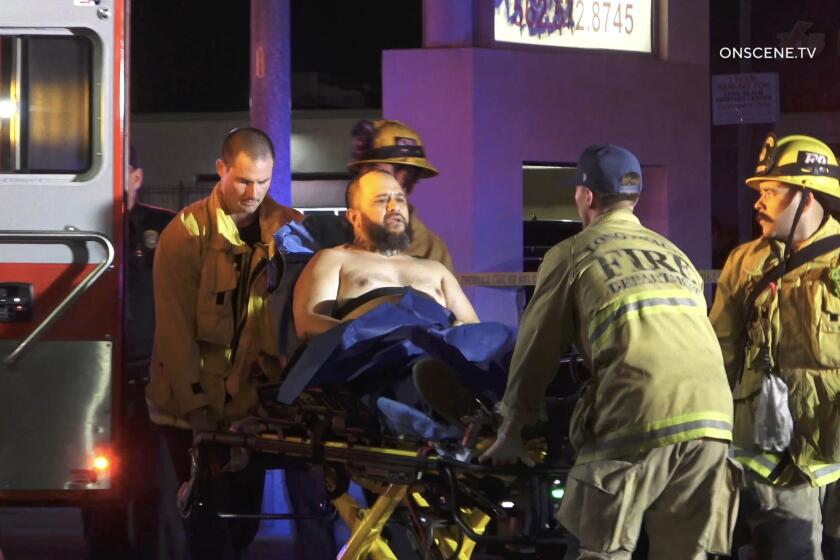VICTIMS OF POLICE MISCONDUCT OFFERED A PLACE TO TURN
Jaime Guadado was walking in his Mid-City neighborhood with a friend two months ago, drinking a beer in the early evening, when Los Angeles police officers in a patrol car pulled up behind him. “Stop!” they ordered. “Put the beer down.”
Guadado, 18, did as he was told, and officers then ordered the youth to put his hands above his head. He put one up but kept the other arm against his body, holding an unopened bottle of beer under his jacket with his elbow.
When he turned to face the police, an officer sitting in a squad car--fearing Guadado might be holding a weapon--shot the youth twice, wounding him in the arm.
Under Investigation Police officials took the shooting under investigation, where it remains, but that did not satisfy Guadado’s mother.
She turned for help to the Police Misconduct Lawyer Referral Service, which listened to her complaint and referred her to attorney Tom Beck, who vows to file suit against police and the city.
In increasing numbers, Southern Californians are calling the referral service--the only one of its kind in the Southland--for assistance.
From their closet-sized office in the Los Angeles headquarters of American Civil Liberties Union, David Lynn and Vina Camper, who run the service, advise people from San Bernardino to San Fernando of their legal options when they believe they have been the victims of police misconduct.
Besides call-in clients, the service also receives referrals from the ACLU, Public Counsel and the State Bar.
After preliminary interviews and investigations, Lynn and Camper then decide whether to refer their clients to the service’s panel of 60 referral lawyers. The attorneys pay $50 annual membership dues and 5% of the fees earned from cases referred to them.
The number of requests received by the agency for assistance has jumped this year, according to Lynn, the group’s coordinator. In 1987, the organization received about 100 complaints a month. So far this year, the group has averaged 170 a month, he said.
‘Related to Gang Sweeps’ “I think it’s definitely related to the gang sweeps,” he said. “It has gotten to the point that if you’re Latino or black and young, you’re an open target.”
In recent months, the service has increasingly been contacted by youths who say they were “jacked up” by police--stopped suddenly by anti-gang officers, frisked, questioned and sometimes roughed up, Lynn said.
Onie Palmer believes she too is a victim of the gang sweeps. When she returned to her Dalton Avenue home in Southwest Los Angeles from a night class Aug. 1, she found her neatly kept apartment in shambles.
Earlier in the evening Southwest Division police broke into her apartment and three others in a gang-related drug raid that ended with eight arrests and the detention of 25 youths in the area. Only one of those charged lived in the four raided apartments.
On her living room floor, sitting on top of broken furniture, bleach-doused clothes and a shattered television was the search warrant.
“I had stuff that belonged to my grandmother. They tore up stuff that I brought all the way from Mississippi,” she said. Palmer said she felt helpless.
Palmer found the service’s number in the telephone book and called. After inspecting the damage, Camper and Lynn referred Palmer to attorney John Burton, who has said he will file a civil rights suit against the Los Angeles Police Department and the city.
But not all the cases referred by the service are gang-related. In April, 1986, Los Angeles resident Arthur Binford, 39, was driving on the San Bernardino Freeway near Baldwin Park when he and an off-duty LAPD officer became involved in a traffic dispute.
The officer claimed Binford cut him off, according to Binford’s lawyer, Carol Watson, a member of the referral service’s executive committee. The two pulled to the side of the road, and as Binford stepped out of his car and approached the officer, he was shot three times in the chest.
Binford lived, despite his injuries, and sued the department and the city. The case was settled out of court when the officer’s insurance policy and the city paid Binford $92,500.
Help in Filling Out Forms The service also helps residents fill out and file the forms required to lodge an official complaint with a police agency’s internal affairs office. And because residents sometimes feel intimidated when they file complaints, Lynn said he sometimes accompanies them to the Police Department.
Mary Lee, president of the service’s board and an attorney with the Los Angeles Legal Aid Society, said the fear of taking on the police extends to the legal world as well.
“Finding lawyers for these cases has been quite a challenge,” she said.
“We have more cases than we can possibly assign out to attorneys,” said Carol Watson, another attorney on the service’s board of directors. “There is a presumption in the community, particularly in the white middle-class community, that the police can do no wrong.”
This attitude, she said, makes attorneys hesitant to accept cases against police. “In small communities in particular, attorneys are afraid of repercussions. Attorneys have the feeling that it will impact on their business.”
Some Los Angeles law-enforcement officials questioned the need for the referral service. Like other police officials interviewed, Southwest Division Capt. Tom Elfmont said he believes that police internal investigations are sufficient.
“I think there are a lot of other avenues for people to use that are in place,” he said.
Referring to existing government-sponsored options, he said, “All of these . . . are places to turn to. I don’t see them (the referral service) as a viable organization because there are other groups.”
LAPD officials say that local council members can also be tapped for assistance. Spokesmen in the council offices said it is common practice for aides to assist citizens with the filing of complaints.
Called ‘Anti-Police’ Los Angeles County Sheriff’s Capt. David Gomez, the head of the Internal Investigation Bureau, also called internal investigation procedures adequate and described the service as engaging in “anti-police” activities, a description the service vigorously denies.
“I don’t see us as fighting the police,” Camper said.
Michael Zinzun, the head of Los Angeles’ Coalition Against Police Abuse and a member of the service’s board of directors, also denied the charge that the agency is “anti-police.”
“We are demanding accountability, and the only way to get accountability is to have an outside organization monitor police activities,” he said.
Lynn does not hide what he described as the agency’s activist role in monitoring alleged misconduct and other police matters.
The Lawyer Referral Service was one of the community groups that opposed the LAPD’s recent decision to use hollow-point bullets, proven to be substantially more disabling than regular bullets.
Last month, service lawyers were hired by the families of victims of several assaults allegedly perpetrated by San Bernardino County sheriff’s deputies.
Lynn has also teamed up with Hawthorne Police Officer Don Jackson to monitor police gang units with video cameras. Jackson, chairman of an NAACP committee that monitors alleged misconduct, is on administrative leave with pay from the department while his charges of racial discrimination are investigated.
Some Los Angeles’ civil rights lawyers not associated with the service give the group high marks and say it is filling a real need.
“There is a lot of frustration in this area,” said attorney Johnnie L. Cochran Jr., who was instrumental in pushing the city to declare a moratorium on police use of the chokehold. “This (the service) traditionally for the community has been a resource. The fact that they are there is important.”
‘Clobbered by Establishment’ “There is no question that that is a legitimate group of excellent civil rights lawyers committed to representing people who have been clobbered by the Establishment,” attorney Michael Mitchell said.
The State Bar-certified referral service was founded in 1981 by late ACLU lawyer Henry Giler, a fiery community activist in Long Beach who ran the organization out of his home to his dying day.
When Giler died last year, board members hired Lynn, a former human rights worker in Central America with paralegal experience, in December. Two months ago, Lynn, 37, was joined by Camper, 43, who will enter the University of West Los Angeles Law School this fall.
The Bar certifies 75 lawyer referral services throughout California. Certification requires that the agencies file annual records and reports with the Bar and submit to periodic review.
More to Read
Start your day right
Sign up for Essential California for news, features and recommendations from the L.A. Times and beyond in your inbox six days a week.
You may occasionally receive promotional content from the Los Angeles Times.





